Właśnie pojawił się najnowszy ranking konkurencyjności World Economic Forum, tworzony na podstawie opinii prezesów firm. Tabela powyżej pokazuje miejsce Polski w kategorii 12-tej tego rankingu – innowacyjności. Widać jak po ośmiu latach niszczenia polskiej innowacyjności przez rząd PO-PSL, ta teraz powoli się odradza.
ajwiększym wyzwaniem pozostaje aktywność zakupowa rządu, który powinien kierować się nie ceną, ale innowacyjnością kupowanej technologii, najlepiej od polskich firm. Drugie wyzwanie to polskie uczelnie, które stoją plecami do biznesu (poza nielicznymi wyjątkami). Tutaj potrzebna jest prawdziwa rewolucja. Zobaczymy czy minister Gowin da radę mafii profesorskiej, broniącej status quo konfitur (poza nielicznymi wyjątkami).
Zwróćmy też uwagę na potwierdzenie mojego argumentu dokumentowanego przez lata danych. Środki unijne źle inwestowane niszczą innowacyjność. Mamy w 2016 roku dziurę w środkach unijnych, a innowacje firm w B+R silnie rosną. Wiem że obecne kierownictwo Ministerstwa Rozwoju rozumie to wyzwanie i mam nadzieję, że nowa fala środków unijnych na innowacje będzie mądrzej inwestowana.
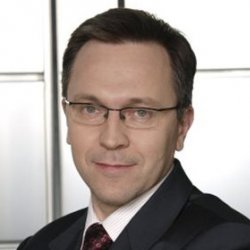
Krzysztof Rybiński
Economy of the XXI century - https://www.mpolska24.pl/blog/economy-of-the-xxi-century
Professor Krzysztof Rybinski holds MA in computer sciences, and Ph.D. in economics. He has an extensive professional background. He worked as software engineer in Tokyo, director of the Soros Foundation programs in CEE, a consultant to the World Bank. He was chief economist and managing director at commercial banks. In 2004, he was appointed the Deputy Governor of the National Bank of Poland by the President of Poland and performed this function for four years until 2008. He was in charge of research, foreign exchange reserves management, payment systems, cash circulation management, monetary statistics and international relations. Under his supervision National Bank of Poland changed its investment strategy which resulted in additional one billion dollars profit for Poland. In 2004-2005, he was member of the EU Economic and Financial Committee, and in 2007-2008 a member of the Polish Financial Services Authority. In 2007-2008 he served as a World Bank alternate governor for Poland. He was also member of the supervisory boards of several financial sector companies (2008-2009) and Partner in Ernst & Young Poland (2008-2010). Since 2010, he has been Professor and President of Vistula University in Warsaw, which offers education to students from more than 30 countries. In 2012 he launched the investment fund called EUROGEDDON, its investment strategy assumes deepening financial crisis in the Eurozone. The fund launch was covered by Financial Times and CNN International.
Krzysztof Rybinski was economic advisor to several Polish governments. In the last few years he was a coauthor of country higher education strategy, e-government strategy and intellectual capital strategy.
Krzysztof Rybinski is author of numerous refereed papers in economics and (co) author of several books. In March 2012 ranking he was ranked the fourth best Polish economist by number of scientific citations. In October 2012 he received the business award of most respected Polish economist. He has also contributed hundreds of articles on economics and financial markets to Polish newspapers. He published in The Wall Street Journal, Financial Times and The Economist. He was the first senior central banker in the world to have started a popular and often quoted by media economic blog www.rybinski.eu already in 2006.

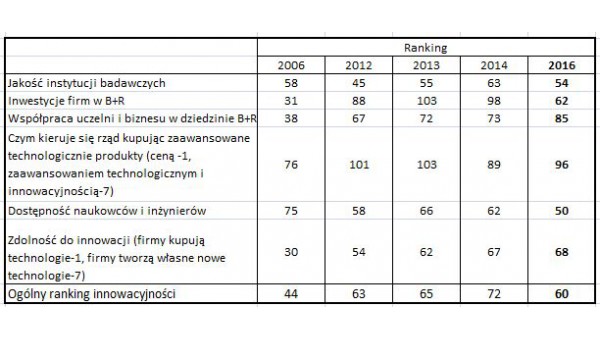
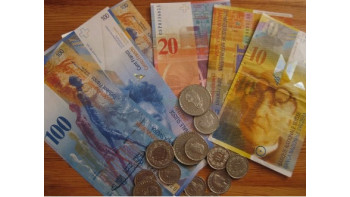
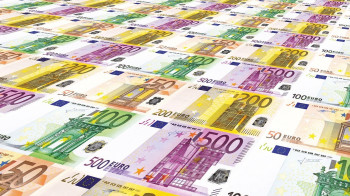



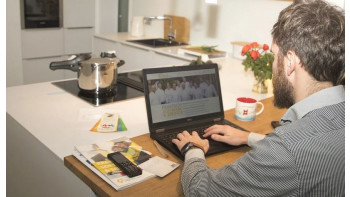

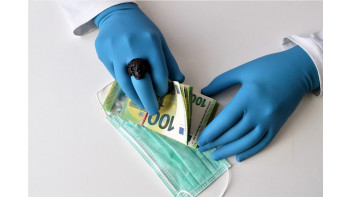








Czegoś tutaj nie rozumiem - od 2006 do 2016 roku ogólny ranking innowacyjności wzrastał osiągając szczyt w 2014 roku (72pkt), a 2016 rok (60pkt) to cofnięcie przed 2012 rok... więc jak to się ma do tezy o niszczeniu innowacyjności przez POPSL skoro w tym okresie właśnie był wzrost ?